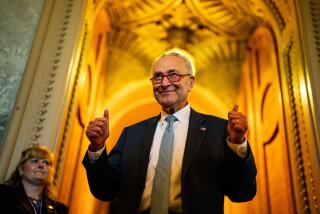House Highway Bill Abandons Gas Tax Increase : Transportation: Leaders unveil a scaled-back package of $151 billion for mass transit and roads over the next six years.
- Share via
WASHINGTON — House leaders unveiled a scaled-back, $151-billion mass transit and highway bill Thursday that abandons a controversial proposal to raise the federal gasoline tax by a nickel a gallon.
The six-year package calls for spending $119 billion on highways and bridges and $32 billion on rail and bus systems. The legislation would pay for the programs by extending a 2.5-cent surcharge on the gasoline tax, enacted last fall, for an additional three years--through 1999. It also anticipates reducing the $11.4-billion balance in the Highway Trust Fund, which is financed by gasoline tax receipts.
The federal gasoline tax rose to 14 cents a gallon at the beginning of the year.
The legislation also cuts $1.8 billion from the $6.8 billion that House leaders earlier had earmarked for special “demonstration projects” for individual congressional districts. The projects, criticized as “pure pork” by some legislators, had prompted veto threats from the Bush Administration. The Administration also had strongly opposed the gas tax hike.
Current transportation aid programs, which had seen only minor changes in the last 35 years, expired on Sept. 30. However, states are continuing to spend money already allocated to them under the old programs.
The original House bill, which would have authorized $153.5 billion in spending over a five-year period, ran into trouble in late July after members balked at approving the gas tax increase. Faced with unexpected opposition, Roe and other committee leaders pulled the bill from the House floor Aug. 1.
The new bill incorporates most of the basic features of the earlier legislation. Generally, it provides states with greater flexibility to shift funds from highway to mass transit programs, provisions that have pleased transit officials.
But separate legislation approved by the Senate in June offers even greater flexibility. The Senate bill calls for spending $123 billion over five years and does not include any specially earmarked money for demonstration projects. In another major departure, the Senate and House bills establish dramatically different formulas to calculate how the Department of Transportation hands out to the states billions of dollars in aid for highway and mass transit programs.
The differences between the two pieces of legislation will be ironed out in a conference committee after the House passes its version of the bill. Floor action in the House is scheduled for next Thursday and Friday.
More to Read
Sign up for Essential California
The most important California stories and recommendations in your inbox every morning.
You may occasionally receive promotional content from the Los Angeles Times.













